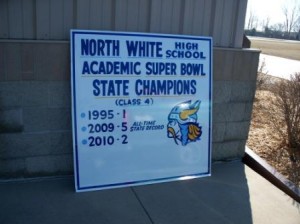The Story Of One Lonely Indiana School District

North White School Corporation
North White School Corporation recently closed two of its outlying elementary school buildings. Reducing the total number of schools in the district from five down to three.
During his tenure as school board president at North White School Corporation, Shannon Mattix has pushed for something strange. Usually, school officials fight to protect their district from outsiders trying to take control, but Mattix has a different idea. He wants to consolidate the four districts in White County into one megadistrict.
“One of the things that I brought up and a few other members of the community brought up was that consolidation needed to happen for the whole county.” says Mattix. He’s talking about a series of meetings dating back to 2000 during which the issue of countywide consolidation was raised.
Among the people in Maddix’s district that StateImpact spoke with, it’s a popular plan. Chris Fullerton owns a little computer shop about ten minutes west of Monticello in the heart of Reynolds Indiana. He can list some specific reasons why he thinks consolidation is a good idea.
“Get rid of the four or five school boards and superintendents we have. Put them all under one roof,” says Fullerton.
But there’s a problem. It takes two school boards, not just one, to approve consolidation and none of North White’s neighbors care much for the idea of joining forces.
Bernard Graser is retiring in about a week, but for the moment, he’s superintendent of the Frontier School Corporation in nearby Chalmers, Indiana. North White has asked his district several times if they would be interested in uniting under one banner. Graser says his district has studied the idea of consolidation but prefers to go it alone. He says the process would require so many changes that it really wouldn’t produce any financial savings.
“There’s just so many variable to go ahead and say let’s consolidate,” says Graser.
There are a lot of similarities between Graser’s district and North White School Corporation. Both are losing money. Both are losing students. Both have laid off teachers and cut programs.
But Graser’s district gets money from local wind farm operations and they’ve been able to use that to muddle through some of the rough financial times that are devastating some of their neighbors.
“They do not have that same pool of money that we have, but if we were to consolidate, we would have to share that money with them,” says Graser.
North White has approached all of the other major districts in the area and each is opposed to the idea of consolidation.
Terry Spradlin works with Indiana University’s Center for Evaluation and Education Policy. His group has spent the last five years tracking school consolidation around the state. He says this is a problem that could have been avoided, especially considering the size of the districts involved.
“The dollars involved in these small corporations as a portion of the state budget are very small, very minimal,” says Spradlin.
North White had enough of a reserve to last them for a few years, but school board president Shannon Maddix says no matter what his counterparts say, there are still major savings that could be had from consolidating. He’s not even talking about anything complicated. He’s talking about the most basic school supplies.
“We can’t even agree to buy paper,” says Mattix.”And if you tell me paper doesn’t impact a child. Last time I checked, we use a lot of it.”
Maybe one of his neighboring districts will have a change of heart and decide to merge with them. If not, Spraudlin says consolidation could happen anyway. It would just take a different form. After all, if a district keeps losing money and eventually closes its doors, then those students end up in their neighbor’s classrooms either way.
